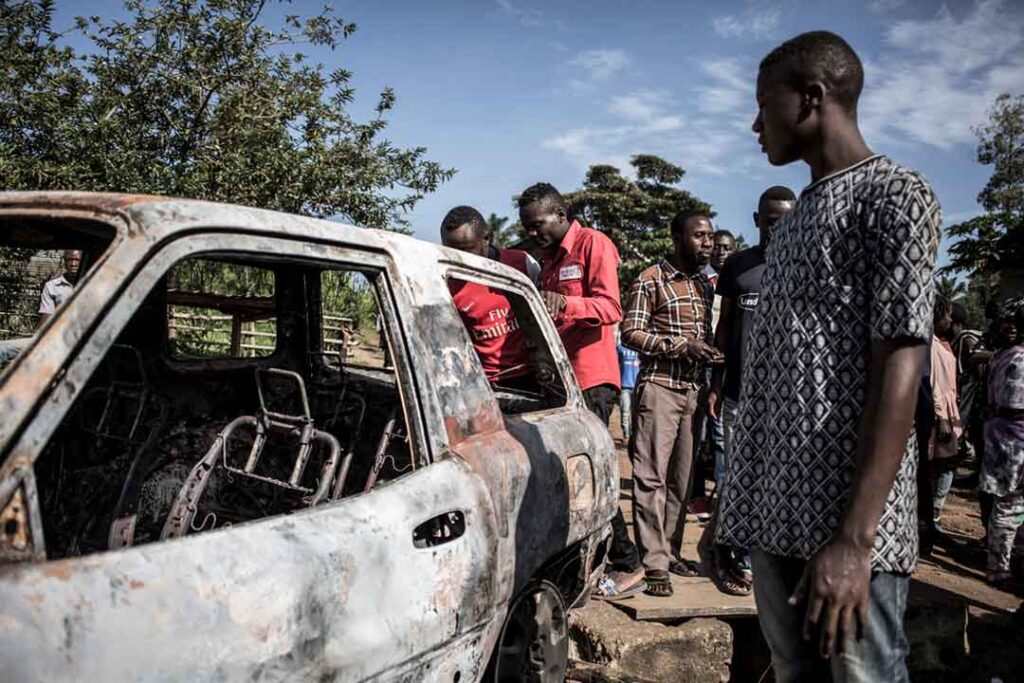Over the past two decades, a series of interconnected conflicts has blighted the Democratic Republic of Congo (DRC), with a disproportionate impact on women and girls. Combatants from myriad rebel groups and the Congolese armed forces have used rape as a weapon of war. While it is nearly impossible to obtain credible statistics on the number of victims, several reports have recorded a pattern of sexual and gender-based violence that has been inflicted on women and girls. Despite numerous peace deals, instability continues to affect the country’s eastern provinces of North Kivu, South Kivu and Maniema. Victims of sexual violence often cannot pursue justice against the alleged culprits because attorneys and courts are many miles away in the DRC’s provincial capitals. However, since 2004 international organisations have harnessed an ambiguity in the country’s 1960 constitution to organise mobile courts (audiences foraines) to hear civil and military cases.
Under the mobile courts programme, international donors, such as Avocats Sans Frontières (Lawyers without Borders) and the American Bar Association-Rule of Law Initiative (ABA-ROLI), fund the travel of Congolese prosecutors and judges from provincial capitals to remote areas, giving poor women and girls a chance of justice. Teams of attorneys help state prosecutors to investigate these crimes. They interview victims, suspects and witnesses, collect evidence and issue summonses. The donors fund the legal aid providers, who supply attorneys to defend the accused. With the assistance of a registrar and bailiff, three judges then hear the case in a temporary court, ideally in a town hall but often under a tent, in plain view of hundreds of onlookers from surrounding villages. These low-tech tribunals sit in stark contrast with those heard by the International Criminal Court (ICC), which has prosecuted several Congolese rebel leaders since the Rome Statute entered into force in July 2002.
In August 2015 the ICC began hearing the case of Bosco Ntaganda at its seat in The Hague. Following clamour from legal experts and civil society groups to bring proceedings closer to victims, ICC judges assigned to the Ntaganda case recommended holding the trial’s opening statements in Bunia in Orientale Province, where the crimes were committed. Unfortunately, they were over-ruled by the court’s presidency, which cited concerns regarding potential trauma, security and high costs, and concluded that the benefits did not outweigh the risks. ICC judges and civil society plan to call 88 witnesses, so Mr Ntaganda may not be sentenced until the end of the decade. His compatriots, Thomas Lubanga and Germain Katanga, spent between six and seven years in custody before they were convicted. In comparison, lawyers in the eastern DRC move very quickly.
On February 21, 2011, a mobile court in Baraka, South Kivu, prosecuted a local commander and eight of his subordinates for rapes committed the previous New Year’s Day in nearby Fizi. Lieutenant-Colonel Kibibi Mutware became the highest-ranking Congolese military officer to stand trial. His conviction within eight weeks of the crimes (at a time when the ICC had yet to issue its first judgment) signalled an end to impunity for local soldiers. “The untouchable has been touched,” said Thérèse Kulungu, the lawyer who represented the 49 victims. Under the DRC’s monist legal system, international treaties ratified by the government are immediately incorporated into national law. Mrs Kulungu took advantage of this structure and applied the Rome Statute and other human rights conventions directly in Congolese courts.
At roughly $4,000 per case, according to the ABA-ROLI, mobile courts compare favourably with the remote, slow and expensive ICC. Itinerant tribunals hear cases close to where the crimes were committed, making it possible for poor Congolese women and girls to testify, seek redress and restore their dignity in front of their communities. Successful convictions send a message that justice can be done, and potentially deter further rapes and violence. The programme, however, has its limitations. The mobile courts hear about 20 cases in a village during an average two-week period. This means judges spend less time deliberating than their counterparts in the provincial capitals. The roving tribunals also report much higher conviction rates than their brick-and-mortar equivalents, leading to accusations of rushed justice. “Judges face a moral obligation to convict” because international donors are paying for their services, Nynke Douma and Dorothea Hilhorst, researchers at Wageningen University in the Netherlands, argue in a 2012 paper.
It is difficult, however, to compare the two court systems. When on the road, prosecutors select and thoroughly investigate a few highly credible cases, whereas in the provincial capitals of Bukavu, Goma and Kindu, prosecutors may pursue numerous cases but fail to accumulate sufficient evidence to obtain a conviction. If a verdict is dubious, donors encourage the lawyers to appeal rather than to question the competence or independence of the judges, explains Charles-Guy Makongo, ABA-ROLI country director. Mobile courts remain “a work in progress”, writes former acting New York Supreme Court Judge Mary McGowan Davis in a 2012 evaluation. They “cannot be expected to meet stringent international due process standards immediately given the significant constraints under which they operate”. Another concern is that Congolese military courts cannot prosecute the most senior generals because the presiding judge must hold a superior rank to the accused.
The Congolese armed forces are extremely top-heavy as a result of successive peace deals that included integrating rebel leaders into the army. This means the “big fish” will escape prosecution, argues Pascale Kambale, an international human rights lawyer with the Open Society Foundations. But this could be improved if the judicial services commission, rather than the military command, nominated judges. This would depoliticise the process and enable the most capable judges to serve across Congolese territory, regardless of the officers posted to their jurisdiction. Of course, the military might resist such an attempt for the civilian legal system to encroach on its independence, but this approach remains the only prospect of addressing impunity. Justice may be closer and quicker, but victims are rarely compensated. International donors only fund the trial phase, and lawyers have little incentive to pursue reparations given the complexity of the system.
For instance in the Baraka case the judges ordered the payment of $10,000 to each of the 49 plaintiffs. The Congolese state argues it lacks the resources to pay compensation when found liable for the actions of army soldiers on duty. In some instances, convicted criminals have escaped from prison. The frequency of jailbreaks in the DRC raises fears of reprisals from the convicted soldiers. Moreover, the future of the mobile courts remains uncertain as long as they depend on international goodwill. Supporters of the courts argue that they were never designed to be permanent but rather to provide a temporary solution to an epidemic of sexual and gender violence. As the conflict dissipates and security improves, the programmes may be phased out. Before they are disbanded, the Congolese should consider what lessons to apply as Joseph Kabila, the president, moves to reconfigure regional government by replacing the DRC’s 11 provinces with 26 new ones.
North Kivu, South Kivu and Maniema provinces will be spared the axe, having been one region until 1988. But in the rest of the country, a renewed government mandate provides an opportunity to revisit services the new provincial capitals should provide. Mobile courts might be one way to restore faith in the role of the Congolese state.

Nick Branson is an Associate Director in the Intelligence and Analysis team at Africa Practice, where he leads engagements on the energy transition. Nick has helped international investors in energy, mining and infrastructure projects navigate complex political, regulatory and macroeconomic risks across the continent. He holds a MA in International Studies and Diplomacy and a MPhil in African Politics from SOAS, University of London. Nick speaks French, Spanish and Portuguese.



